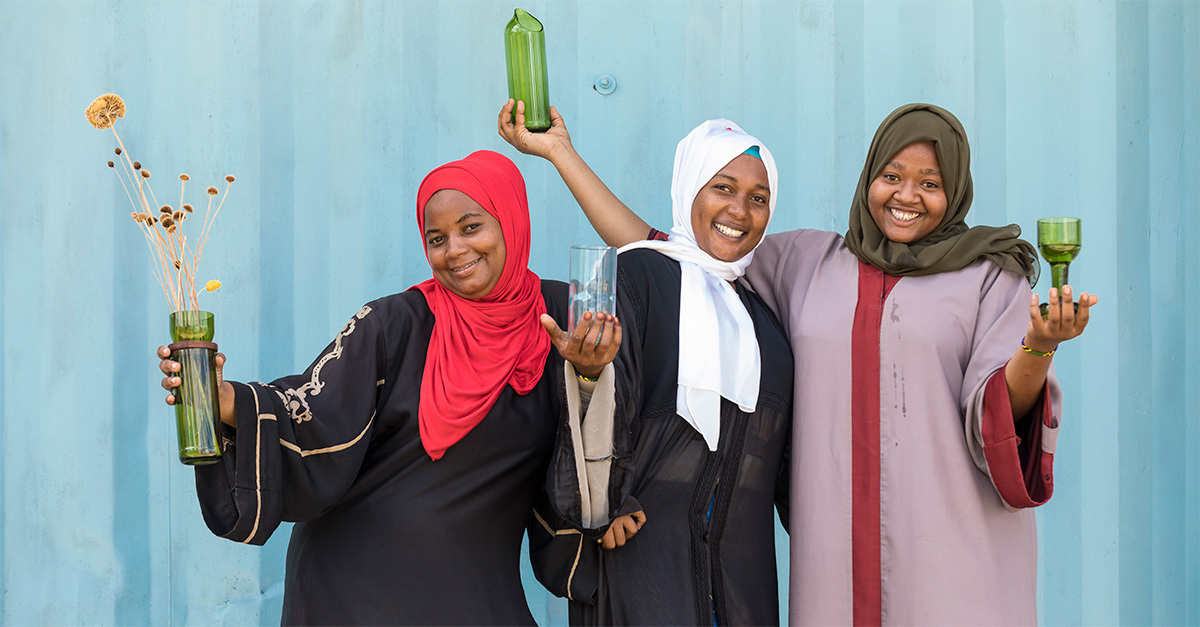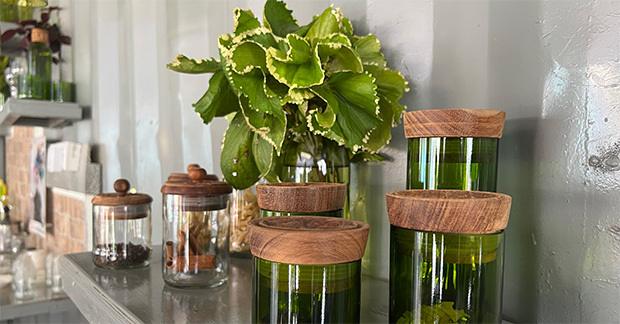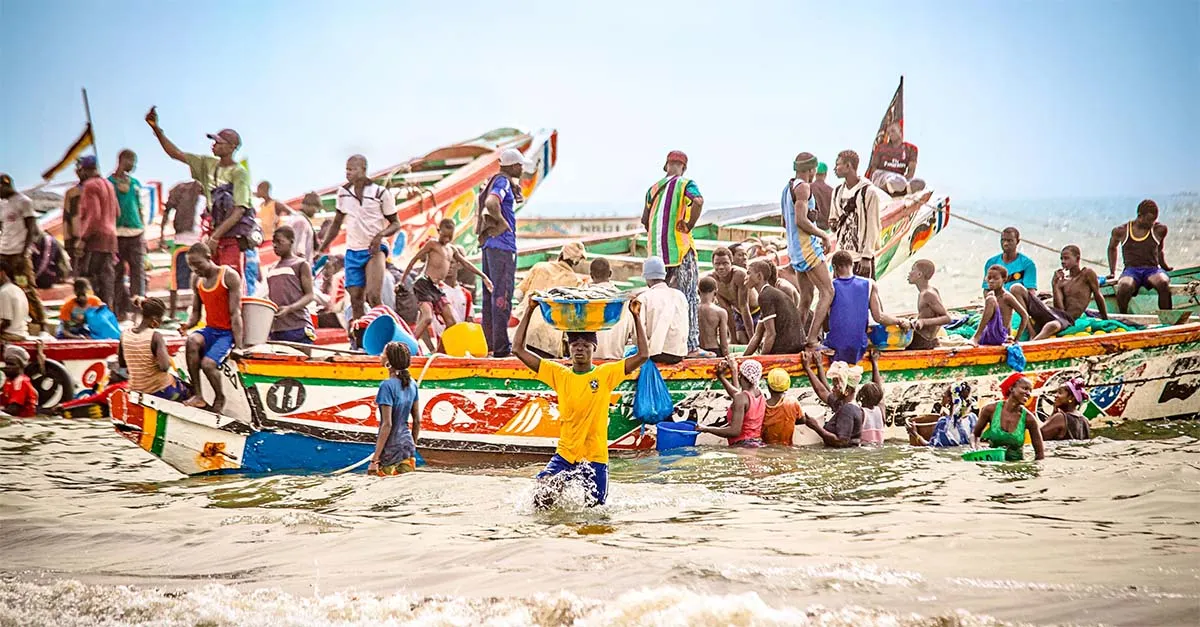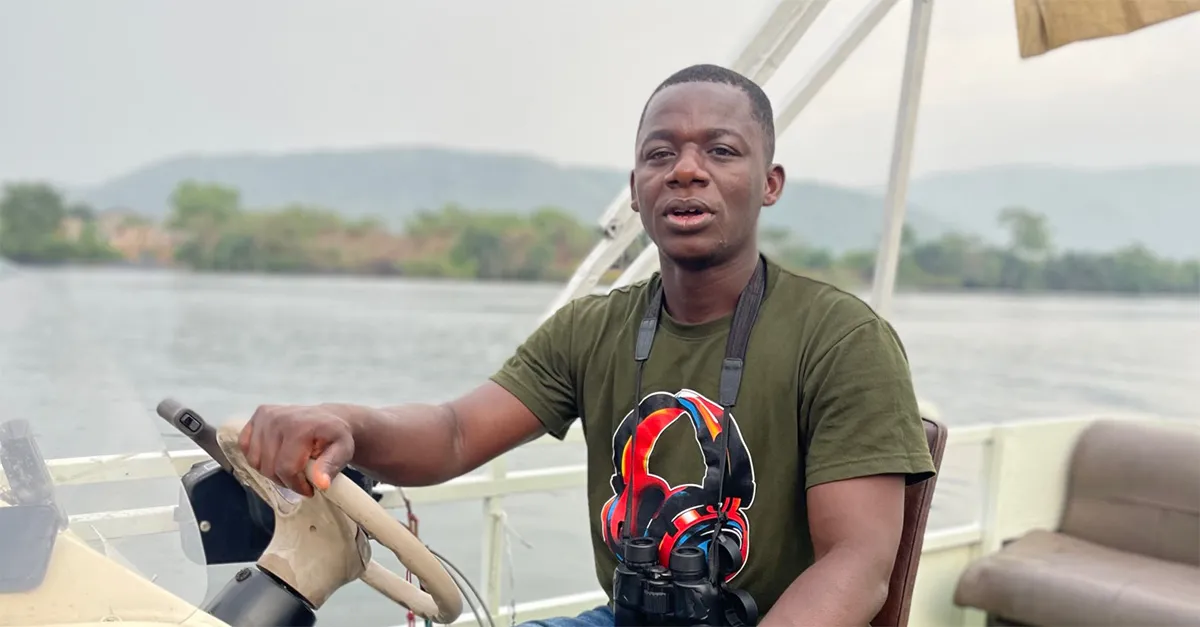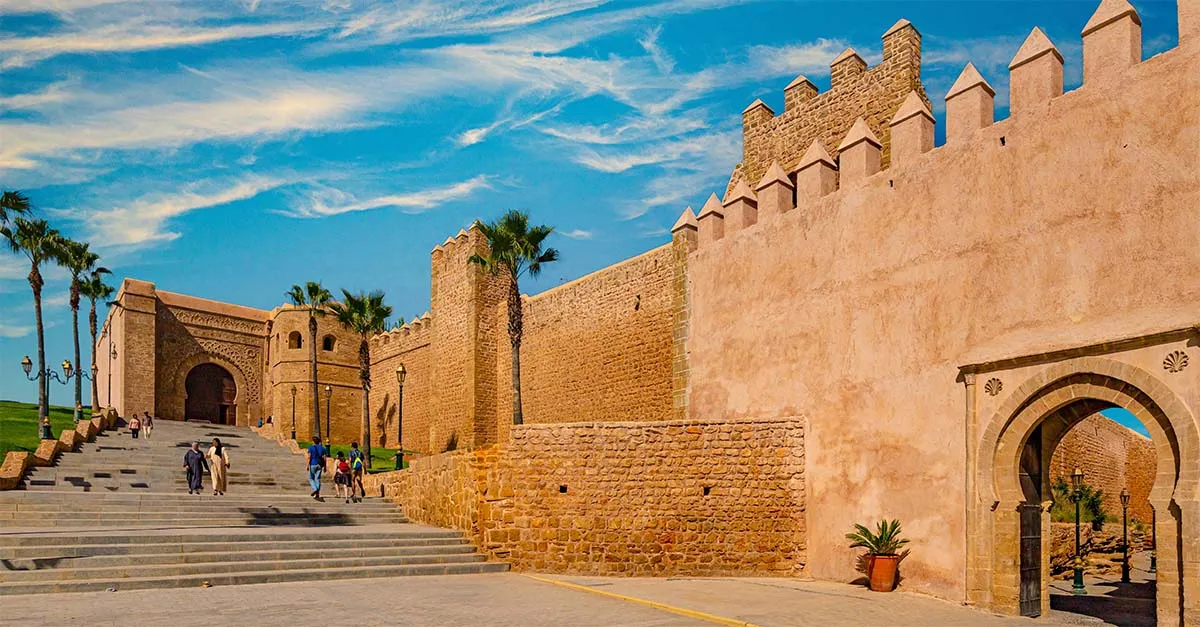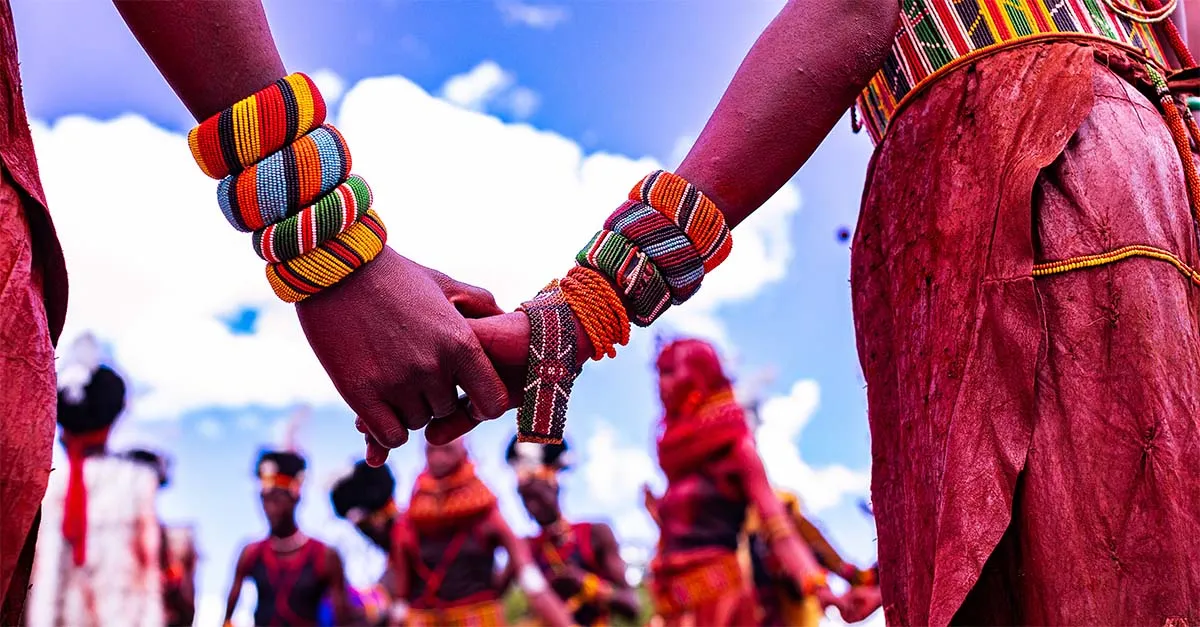You are viewing 1 of your 2 free articles
How tourism could be a force for change in Zanzibar
Discover how social enterprises in Zanzibar are opening up opportunities for women to work in travel-related roles
Click here to download and save as a PDF
As I take a sip of my fresh coconut water and watch the orange sunset melt into the horizon on my last evening in Zanzibar, the glowing sands of Kiwengwa Beach beneath my feet, my fingers trace the woven patterns of a beach bag on my shoulder which I’d purchased from Chako, a Zanzibari social enterprise.
Crafted from an old rice sack and skilfully put together by local artisans, my bag looks like a rare vintage find, with the original rice brand boldly displayed. I’d been carrying it proudly all week, a reminder of how sustainability is woven into the fabric of this island. The eco-friendly vibe of Zanzibar was unexpected, yet everywhere.
When people think of Zanzibar – an archipelago of more than 50 islands that sits 22 miles off the coast of mainland Tanzania – the word “sustainability” probably doesn’t spring to mind.
But in 2019, the government banned plastic bags and now hotels and NGOs across the island are adopting initiatives to help tourism become greener. I visited Zanzibar with the Tui Care Foundation, an independent charitable organisation founded by the Tui Group, that uses tourism to create lasting impact through holidays.
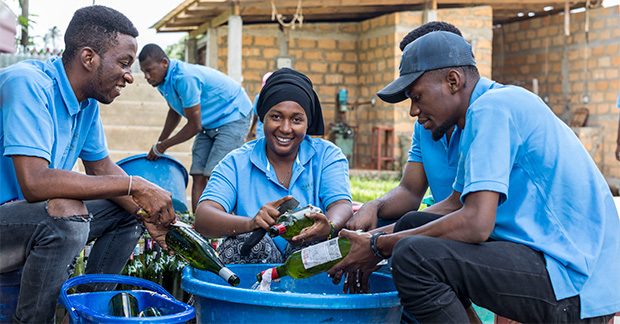
Artisans recycling glass in Zanzibar. Image credit: Tui Care Foundation
Upcycling at Chako
I see this in action at Chako, a creative enterprise founded in 2012 by Zanzibarian-Dutch couple Suleiman and Anneloes, and now a Tui Care Foundation partner.
Located on a lush spice farm 30 minutes from the capital, Stone Town, Chako’s workshop employs 45 artisans to create beautiful handcrafted, upcycled items from things that would otherwise be thrown away.
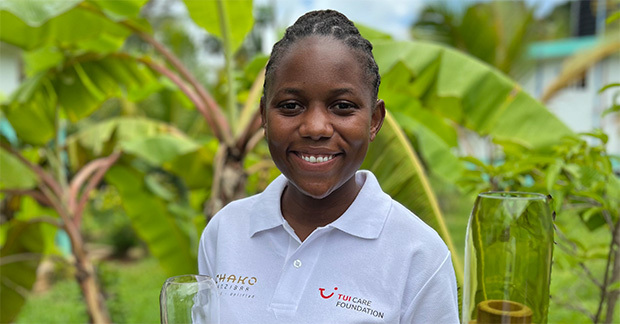
Chako, a Zanzibari social enterprise. Image credit: Tui Care Foundation
Every Monday and Tuesday, they travel around the island to collect plastic waste and glass bottles from hotels, which are then turned into gorgeous lamps, drinking glasses and kitchenware available to buy in their workshop and in a shop in Stone Town.
Around two-thirds of Chako’s employees are women. I speak to Najma Ali, a 24-year-old carpenter, and watch as she expertly carves an ornate wooden cap at her workbench, which will eventually be attached to a storage jar upcycled from a wine bottle.
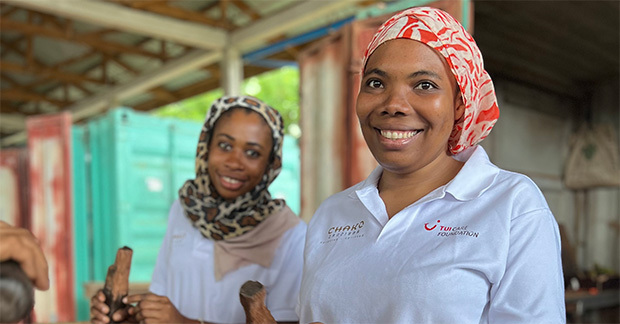
Chako, a Zanzibari social enterprise. Image credit: Tui Care Foundation
“If I wasn’t doing this, I’d be selling chapatis on the road, which I did before,” she says. Carpentry is a male-dominated job in Zanzibar, a Muslim destination that has historically placed emphasis on women having more traditional roles in the home. But Ali tells me things are changing, saying: “Chako doesn’t [worry] about employing women to do woodwork.”
Hotels such as The Mora Zanzibar or Tui Blue Bahari Zanzibar – both five-star, all-inclusive resorts in the north of Zanzibar (Tried & Tested, page 48) – often buy back Chako’s designs, making it a circular business model that also helps keep the beaches pristine.
Products from Chako. Image credit: Tui Care Foundation/C Flechtner
Training at the Tui Academy, Zanzibar
The focus on sustainable travel extends to training local people in tourism jobs so they can find employment on the island – and I’m excited to see it. One sunny morning I set off to Tui Academy in Stone Town.
Tui Care’s educational institute trains 120 young Zanzibaris in English, maths, hospitality and environmental awareness through its partner, the Kawa Training Centre.
Set on the second floor of a narrow building in the midst of the frenetic capital, the Kawa Training Centre jostles with activity. Outside are winding streets full of motorbikes and souks selling spices and even spiky durian fruit.
But inside, there’s a full classroom and I listen to enthusiastic students (up to the age of 21) reeling off facts about their home for a tourism lesson, part of a six-month module.
Others show off their practical training in a mock restaurant service as part of their hospitality module, which spans nine months and includes an internship in a hotel or restaurant.

Students at the Tui Academy, Stone Town. Image credit: Tui Care Foundation/Daniel Scheffler
Zanzibar recorded 736,000 international visitors in 2024, an increase of 15% compared with the previous year, with the UK ranked as the fifth-biggest European market.
Hospitality and tourism jobs are a vital part of the economy and Tui Academy aims to place at least 80% of its graduates in a job within six months of graduating.
But there is still a stigma surrounding female tour guides in Zanzibar, and this class is mostly made up of young men. I speak with Saida Malik, 32, who trains tour guides with Tui Care and works as one herself.
She stepped into the industry to support her siblings after her parents died. “I didn’t tell other people at first because some have a perspective that women in tourism are prostitutes,” she says. “I’ve met a lot of people and I love what I do because I learn every day. It’s important for women to be free.”
Her words stay with me when, on my final day, I take part in Safari Blue, an immersive boat cruise to the conservation region of Menai Bay.
I snorkel in crystalline waters, spotting clownfish darting through cream-coloured coral and then sunbathe on snow-white sands, before feasting on lipstick-bright watermelon and a seafood lunch on a sandbank.
I’m grateful for the freedom to experience the rhythm of Zanzibari life through conservation efforts, cultural exchanges and the simple joy of being present in this paradise – and to meet some of the creative entrepreneurs who are shaping the Zanzibar tourism scene and will continue to do so for years to come.
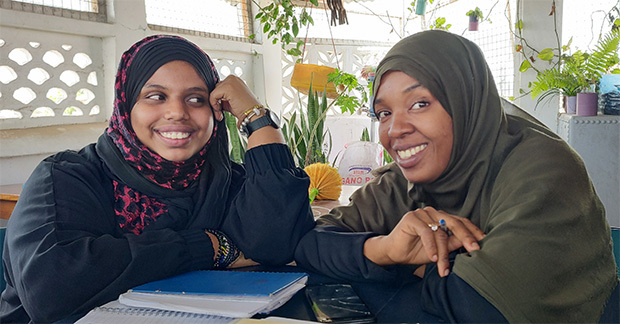
Tui Academy Zanzibar. Image credit: Tui Care Foundation
Book it
Tui offers a seven-night holiday at Tui Blue Bahari Zanzibar, departing on May 27, from £1,676, based on two sharing a Deluxe Double room. A week at The Mora Zanzibar, departing on May 31, costs from £1,910, based on two sharing a Junior Suite. Both prices are per person on an all-inclusive basis, and include flights from Heathrow and transfers.
tui.co.uk
Tried & tested
The Mora Zanzibar
Zanzibar’s main island, Unguja, was chosen as the first outpost for Tui’s new upscale brand, The Mora, which will be rolled out across The Gambia, Senegal, Tanzania, Kenya and Cape Verde – renaming a property that first opened in December 2022. Its design feels gorgeously curated, with ornate wooden desks and giant mirrors in the lobby. It’s perfect for honeymooners and offers direct access to the quiet – though public – Muyuni Beach.
The Mora is huge, and staff are often on hand to drive guests around in buggies. There are six pools and 250 modern, spacious suites equipped with mosquito nets and adorned with colourful artwork. The five restaurants serve everything from incredible fresh seafood to Japanese sushi (via a lively teppanyaki show). There is also a gym and spa.
themora.com
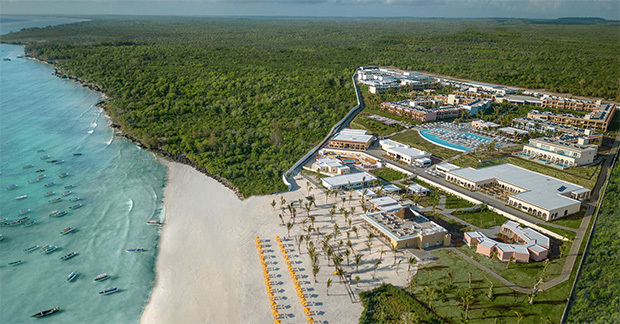
The Mora Zanzibar
Tui Blue Bahari Zanzibar
Just 10 minutes’ drive away, Tui Blue Bahari Zanzibar sits on the powdery white sands of Kiwengwa Beach – busier than Muyuni but with breathtaking views of the turquoise Indian Ocean. Catering more to families and solo travellers, the resort features a gym, three bars, five restaurants and three pools, including one for children.
The nightly line-up of events, accessible via the guest app, keeps the place buzzing. One evening, I watched a traditional jumping performance by Maasai warriors while enjoying a sunset beach dinner featuring grilled prawns and Zanzibari cuisine such as urojo, a spicy, tangy soup served with fried potatoes and meat skewers – a magical end to the day.
tui-blue.com
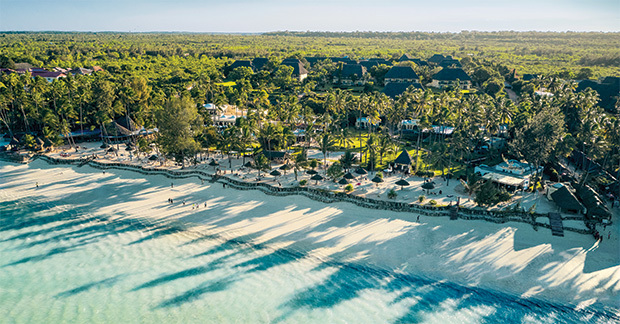
Tui Blue Bahari Zanzibar. Image credit: Karsten Koch
Lead image: Tui Care Foundation/C Flechtner

